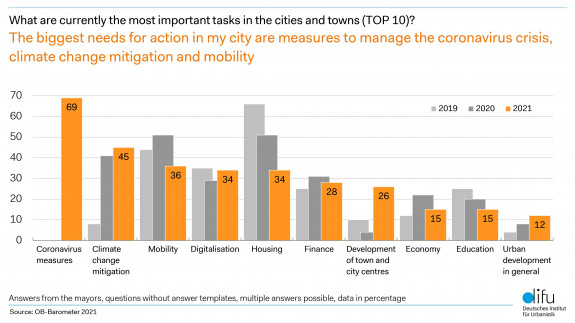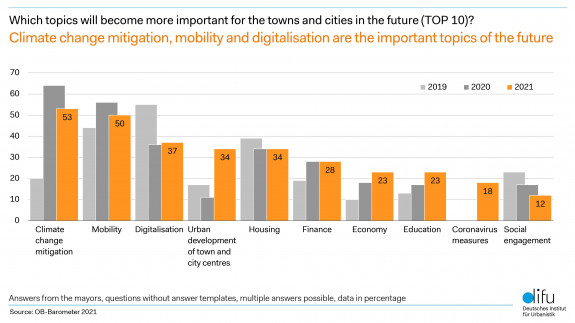
Climate change mitigation becomes increasingly important for cities
A contribution by Carsten Kühl and Beate Hollbach-Grömig
This year’s OB-Barometer from the German Institute of Urban Affairs is dominated by the coronavirus pandemic. It is therefore not surprising that in answer to the question about the current most important tasks in the cities and towns, overcoming the coronavirus crisis and its consequences was mentioned most frequently by far (69 percent). In contrast to the usual areas of action, there was no comparison value for the previous year because the last survey period was in January and February 2020, i.e. before the pandemic. The aim of the survey carried out in January and February 2021 is to determine an overall picture from the perspective of the city and town leaders regarding the most important tasks and challenges for the German municipalities. Leaders of German towns and cities with at least 50,000 residents were surveyed. The results are based on a representative telephone survey of the mayors, which was carried out in January/February 2021 by the infratest dimap polling institute.

This year, it is particularly interesting to take a look at the remaining areas of action and their development over recent years: topics under the heading “climate, energy, sustainability” have again gained in importance in 2021. They were named so frequently by the surveyed mayors that they are now the second most important area for action in the municipalities (45 percent). If you disregard the exceptional coronavirus situation (69 percent), it is even currently the most important municipal area of action. Until and including 2019, municipal climate change mitigation had only played a subordinate role. In 2020, the policy area experienced a large increase in importance. The assumption suggests itself that also through the Fridays for Future demonstrations political decision-makers have become more aware of climate change mitigation. However, it was unclear how sustainable this effect would be and whether “environmental topics” would again slide down the scale of priorities in light of other big crises, which has already happened several times in the past. That does not appear to be the case this time. Climate change mitigation is rated as even more important than in 2020. Even the future topics of “climate, energy, sustainability” (53 percent) have held their top position ahead of mobility (50 percent) and digitalisation (37 percent). Urban mobility policy concepts are today primarily traffic policies, which are intended to curb private transport. They aim to reduce CO2 and fine dust pollution and are therefore constituent parts of a municipal environment and climate change mitigation policy. The fact that climate change mitigation and mobility occupy a top position both for current and future important topics underlines the great importance that the city and town leaders attribute to ecological matters. In contrast, digitalisation has not again gained in importance on a municipal level as a result of the requirements and changes in the coronavirus pandemic.
Smart City, housing construction and finance are “old friends” among the most important current areas for action and among the municipal policy topics with increasing importance. They remain more or less unchanged in the rankings. It may be a surprise that the financial situation of the municipalities has not been more prevalent because the municipalities have recorded extreme losses in tax income due to the coronavirus. The fiscal compensation measures from the German government and the federal states have presumably contributed to the fact that the municipalities now and in the future estimate that their financial situation be roughly the same as the previous two years.

However, it is noticeable that the topic of town and city centre urban development has greatly increased in importance among both current and future challenges. The answers to the question on the challenges of the coronavirus pandemic provide an explanation. Threatened existences in retail, gastronomy and the culture sector rank very highly as does the desertion of town and city centres. In the times of the coronavirus, the town and city centres are under threat in terms of the economic existence of gastronomy and retail; empty urban centres lose their welcoming quality. The “forced experiment” of digitalisation caused by the coronavirus, in particular the massive increase in online shopping and working from home, has accelerated a process of change that was taking place anyway. Therefore, the town and city centres are on the verge of a massive change. The mayors regard this as a great challenge.
In January and February 2021, the mayors appeared to at least have the hope that the topic of coronavirus would soon be in the past for municipal policy. While more than two thirds of all town and cities leaders named coronavirus measures and consequences as a current important area for action, the topic of COVID-19 ranked second to last among the important future areas of action. There was only little change in the leaders’ desires for the areas of action regarding better framework conditions from the federal states, the German government or the EU: the desire for support in the area of action for digitalisation has gained in importance (71 percent). It is presumably largely due to the shortages that became clear during the coronavirus pandemic – for example; data transfer in local health authorities, the option of administration staff to work from home or the digital infrastructure equipment of schools. The areas of action regarding finance, housing policy and traffic came next; in them the weighting has only gradually shifted. In comparison to the answers from the town and city leaders in previous years, a continuity in the general policy lines of municipal policies and the desired improvement for the framework conditions for the local work can be determined
from: Difu-Magazin Berichte 2/2021